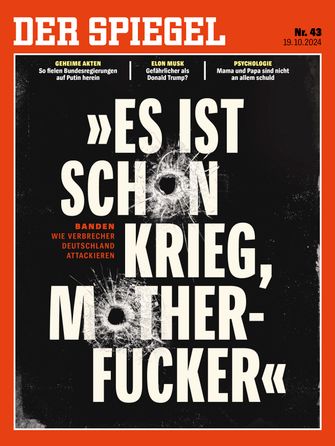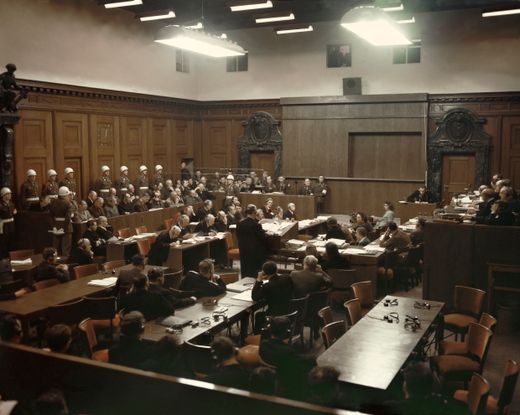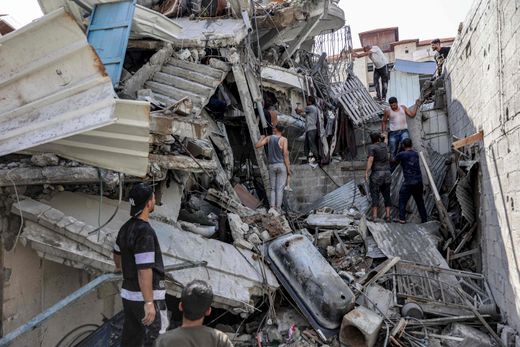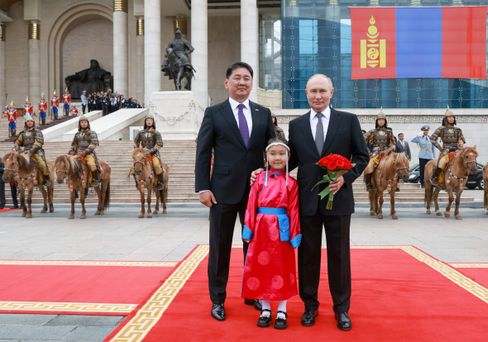DER SPIEGEL: Mr. Khan, we are meeting here in Nuremberg, where a trial against Nazi criminals took place almost 80 years ago. What are your thoughts when you set foot in this city?
Khan: The International Criminal Court is a child of Nuremberg. It had a singular significance in that it stood above the rubble and devastation of World War II, above the massive human toll, and demanded that people who were marginalized, the Jewish people and people who were targeted by National Socialism, receive justice. The Nuremberg Trials took place in this building, in courtroom 600, and they continue to reverberate through the decades. The decision to apply the law, this quest for humanity in the politically difficult days after the end of the conflict was a landmark moment. That decision made the creation of Yugoslavia and Rwanda tribunals possible. It paved the way for the special courts for Sierra Leone and Cambodia. And, of course, for the ICC.
Karim Khan, born in 1970, is a British lawyer. Before being elected chief prosecutor by the state parties to the International Criminal Court (ICC) in The Hague in 2021, he worked as a defense lawyer and prosecutor before various international courts. The chief prosecutor leads the investigations into crimes for which the ICC has jurisdiction: genocide, war crimes and crimes against humanity. In May 2024, Khan applied for arrest warrants against Israeli Prime Minister Benjamin Netanyahu and Israeli Defense Minister Yoav Gallant, and at the same time against three Hamas leaders, each for war crimes and crimes against humanity. He was supported by a panel of experts that also included human rights lawyer Amal Clooney and Holocaust survivor Theodor Meron. Israel’s leadership is said to be responsible for starving the civilian population in Gaza as a method of war, while he holds Hamas leaders responsible for attacks on civilians and hostage-taking. Since then, Khan has been waiting for the judges to grant his application.
DER SPIEGEL: The ICC was founded in 2002, and you have been chief prosecutor since June 2021.
Khan: It’s sad that we still need an ICC. We have failed to live up to the promise of Never Again that was made in Nuremberg. People around the world are crying, they are in agony not just in Palestine and Israel. Look at Afghanistan, Darfur, Congo. There is so much suffering because of this proclivity to allow power to trample people. International law is one of the devices that scrutinizes conduct not based on emotion – but based on facts.
DER SPIEGEL: In May, you issued an arrest warrant for Israeli Prime Minister Benjamin Netanyahu and Israeli Defense Minister Yoav Gallant, and also against Hamas leaders Yahya Sinwar, Mohammed Deif and Ismail Haniyyeh. In response, Netanyahu harshly accused you of anti-Semitism. Did that hurt?
Khan: I’m not that thin-skinned. There is a lot of abuse and threats and games going on between political leaders, intelligence agencies and interest groups. But I know who I am. The first time I went to a synagogue was with my late father and my mother when I was about six, in Leeds. Last year, I held the Elie Wiesel lecture in Ottawa. I don’t think the Raoul Wallenberg Center would have invited an anti-Semite to give such an important lecture. The Jewish religion is the great teaching of the Prophet Moses, and I have a lot of respect for the Jewish people and the Jewish faith. We are seeing an increased tendency of sidelining people by simply labeling them as an anti-Semite. Quite frankly, I think what is of more concern is what victims expect from the law and their demand that the law be applied equally, everywhere around the globe.

DER SPIEGEL [M]: alptraum / iStockphoto / Getty Images; Ilya Andriyanov / imageBROKER RF / Getty Images
The article you are reading originally appeared in German in issue 44/2024 (October 19th, 2024) of DER SPIEGEL.
DER SPIEGEL: When you took office in June 2021, it didn’t initially look as though you were interested in investigating the situation in the Palestinian Territories, even though your predecessor Fatou Bensouda had left you a case pertaining to Israeli settlement police in the West Bank. Why now?
Khan: My predecessor opened an investigation three months before she left. I came in with no team and no resources, but still tried to move things forward. Then came the events of October 7, an awful hemorrhage for the Jewish people. But the response of the Israeli government also set off the alarm bells – and not just for me, but for the secretary general of the United Nations, the high commissioner of human rights, the World Food Program. The list goes on. Except for Canada, every other ICC member state accepted the state of Palestine as a state party. Judges, after considering the matter, said we had jurisdiction. The question should be: Why shouldn’t we investigate? Is it right for a particular geographical region to be outside the law? Do Palestinians and Israelis not deserve the same legal protection as the people of Ukraine or Sudan, or the Rohingya? And you must remember, there were referrals in Ukraine in 2014 and 2015, but the events of February 2022 also required a response because the situation on the ground had changed.

Legendary Room 600 in the Nuremberg Palace of Justice where the post-World War II trials against senior Nazi officials took place
Foto: akg-images
DER SPIEGEL: In the past, the ICC has had the opportunity to apply the law to Western politicians as well, such as to the British for torture conducted in the war in Iraq. Why were they not investigated, but the government of Israel now is?
Khan: I was elected prosecutor in June 2021, and I’m not going to go into matter prior to that. We have opened proceedings in Russia, Georgia, Sudan and Libya. The list goes on and on. Unfortunately, crimes are committed in every jurisdiction of the world. Our job is to make sure that there isn’t any free pass. Palestine is a state party to the ICC. What we’ve done is a function of jurisdiction.
DER SPIEGEL: You say that nobody stands above the law. And yet one of your first official acts as chief prosecutor was to suspend the investigation into the U.S. activities in Afghanistan.
Khan: That’s not true. The investigation was de-prioritized. I simply made a decision based on my resources that I would give more attention to ongoing violations than historic ones – such as the activities of the Taliban or of Islamic State in Khorasan. It’s not the case that anybody was given a certificate of immunity.
DER SPIEGEL: By issuing the arrest warrants against Netanyahu and Yoav Gallant in parallel with those against the Hamas leadership, the impression was created that you were equating democratically elected politicians with terrorists. Was that wise?
Khan: Every victim is equal. I have as much regard, attention and love for a Jewish child as for a Palestinian child, or any other person anywhere in the world, regardless of the color of their skin, religion, age or sexual orientation. It’s about equality before the law. I have the responsibility to investigate as effectively as I can. Once we came to the conclusion that the evidence justified arrest warrants – for members of Hamas and for Israeli officials – I was compelled to move forward. I would ask your readers to think about what the alternative might have been.

The destroyed Jabaliya refugee camp in the Gaza Strip
Foto: Omar Al-Qattaa / AFP
DER SPIEGEL: What would the alternative have been?
Khan: Imagine I had only applied for an arrest warrant for Israeli nationals. People would say: What a fanatic. What an anti-Semite. He is refusing to apply the law to the vile acts of October 7, killing babies, taking Holocaust survivors as hostages. If I had only moved against the Hamas members, imagine them saying: What a disreputable court, in the pocket of the U.S., Germany and all these powerful countries. But what about the 30,000 or 40,000 people dead in Gaza, mothers giving birth to stillborn children, famine and starvation. So those who are accusing me of equating Israel with Hamas should ask themselves: What were the options? Or is there complaint that the law is blind and that we have independent courts?
DER SPIEGEL: Germany’s argument has been that the ICC is a court of last resort and according to the Rome Statute, it should only intervene when the state in question is unwilling or unable to. Yet Israel has a functioning judicial system. Why not let it do its work?
Khan: Israel has very capable lawyers and judges. The question is: Is the law being applied in the occupied territories? If you read what experts are writing and look at what’s happening on the ground, we don’t see investigations. We don’t see accountability. Again: What is the complaint? Is it simply that there should be no justice because a country is an ally?
DER SPIEGEL: Many have said that the application for an arrest warrant against Netanyahu has limited his willingness to compromise to obtain a ceasefire with Hamas. Isn’t peace more important than justice?
Khan: I applied for the warrant on May 20. At that point, there had been no ceasefire, despite the fact that many family members of the hostages, the international community, the UN secretary general and many others had been insisting on one for months. To simply say there is no ceasefire because of the ICC is not supported by logical reasoning. And fundamentally, peace and justice are two sides of the same coin. If the UN Security Council concludes that investigations are standing in the way of a peace deal, it can, according to Article 16 of the Rome Statute, request that proceedings be suspended at any time. My job is to apply the law to get to the truth. Everything else is up to the state.
DER SPIEGEL: In addition to being at war with Hamas, Israel is now fighting against the Hezbollah in Lebanon and will perhaps soon be engaged in a conflict with Iran as well. Wouldn’t it have been better to wait until the fighting was over?
Khan: Should I wait until everybody’s dead? If your father, your mother, your grandfather was a hostage, would you really want me to wait? If this was your child or your sister blown to bits, would you want me to wait? We shouldn’t indulge ourselves into thinking that the suffering of people is something to comment on in the future. The law must be felt in real time. If you are a firefighter, you don’t wait until the house is burned down and the neighborhood is in flames.
Related Article
DER SPIEGEL: Isn’t that the job of the politicians?
Khan: Around the world, many people are not buying what we are selling. They no longer believe in the promise of “never again.” When I travel to Darfur or Chad, when I go see the Rohingya and to the kibbutzim, people say: We don’t think you see us. Justice must be a birthright. If we don’t show that we are colorblind, that a Black life and a white life matter equally, that a believer and a nonbeliever, that Christian, Jews and Muslims all deserve equal protection before the law, then the law is gone and we are responsible f that disintegration. We become voyeurs to tragedy.
DER SPIEGEL: In March 2023, you applied for an arrest warrant against Russian President Vladimir Putin. Yet Putin was able to travel to Mongolia in summer, even through that country is a ICC member state. Are you not taken seriously around the world?
Khan: It’s a question of perspective. Mongolia is the only ICC member state Putin has visited since 2022, and heads of state travel a lot. I agree that the law is not as strong as I want, but it’s not as weak as many people think. That’s proven by the examples of Bosnian Serb leader Radovan Karadžić, the Serbian leader Slobodan Milošević and Liberian warlord Charles Taylor. It has been shown by courts here in Germany, which have prosecuted members of Islamic State. We can apply law universally and show accountability. But it requires all of us to be more than just spectators.

Russian President Vladimir Putin with Mongolian President Ukhnaagiin Khurelsukh in Ulaanbaator.
Foto: Vyacheslav Prokofyev / ITAR-TASS / IMAGO
DER SPIEGEL: The Israeli secret service issued a threat against your predecessor, the Russian agency FSB tried to plant an agent in your team, and the site of meetings with you must be kept secret. You once said that you had quite a nice life before taking this job. Is it worth it?
Khan: It is well known that the court and its staff, myself included, are subject to a number of threats and attempts at intimidation. Some of these are public, others are not. I fear they will continue. We must not be deterred. Some may disagree with my decisions, but I believe we are all united in the desire to protect the independent enforcement of the law.
DER SPIEGEL: Mr. Khan, we thank you for this interview.
This post was originally published on this site be sure to check out more of their content.








